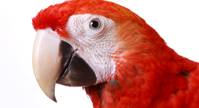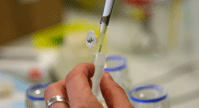Labrador Centronuclear Myopathy (CNM or CM)
Description:
 Centronuclear Myopathy (CNM), previously known as HMLR, or Hereditary Myopathy, is an autosomal recessive mutation that causes insufficient muscle function in the Labrador Retriever breed. This is due to the centralisation of the nuclei in muscle fibers, caused by a missense insertion in the PTPLA gene.
Centronuclear Myopathy (CNM), previously known as HMLR, or Hereditary Myopathy, is an autosomal recessive mutation that causes insufficient muscle function in the Labrador Retriever breed. This is due to the centralisation of the nuclei in muscle fibers, caused by a missense insertion in the PTPLA gene.
Puppies are born apparently normal; however, it quickly becomes evident that there is a problem. The puppy will often not gain weight adequately due to decreased muscle tone in the esophagus. Within 2 to 5 months, the disease has usually progressed to display the full range of symptoms, including a loss of muscle tone and control, an awkward gait, and extreme exercise intolerance. This condition is exacerbated in cold conditions.
Unfortunately, there is no cure for CNM, as the dog will never develop properly functioning muscle tissue. The dog usually has a normal life span but he will always be plagued with the symptoms of Centronuclear Myopathy.
Centronuclear myopathy is a recessive disorder, meaning that the dog must have two copies (CNM/CNM) of the defective gene to suffer from the disease. A dog can also be a carrier (CNM/n) of this disease, and will not display any symptoms. A carrier dog will pass on the mutation that causes CNM to 50% of it's offspring. If mated with another carrier dog, there is a 25% chance of producing an offspring affected by Centronuclear Myopathy.
Sample Type:
Animal Genetics accepts buccal swab, blood, and dewclaw samples for testing. Sample collection kits are available and can be ordered at test now.
Test Is Relevant To the Following Breeds:
- Labrador Retrievers
Results:
Animal Genetics offers DNA testing for Centronuclear Myopathy (CNM). The genetic test verifies the presence of the recessive CNM mutation and presents results as one of the following:
| CNM/CNM | Affected | The dog carries two copies of the mutant gene and is homozygous for Centronuclear Myopathy. The dog is affected by Labrador Centronuclear Myopathy and will always pass a copy of the mutated gene to its offspring. |
| CNM/n | Carrier | Both the normal and mutant copies of the gene detected. Dog is a carrier for Centronuclear Myopathy and can pass on a copy of the defective gene to its offspring. |
| n/n | Clear | Dog tested negative for the Centronuclear Myopathy gene mutation and will not pass on the defective gene to its offspring. |
References:
Maurer M, Mary J, Guillaud L, Fender M, Pelé M, Bilzer T, Olby N, Penderis J, Shelton GD, Panthier JJ, Thibaud JL, Barthélémy I, Aubin-Houzelstein G, Blot S, Hitte C, Tiret L. Centronuclear myopathy in Labrador retrievers: a recent founder mutation in the PTPLA gene has rapidly disseminated worldwide. PLoS One. 2012;7(10):e46408. doi: 10.1371/journal.pone.0046408. Epub 2012 Oct 5.
Submit a Sample for Testing:
To submit a sample for testing please go to test now.
To
order a sample collection kit please go to order sample collection kits.
Cost per sample is $45.00. Please see our Canine Fee Schedule for all test rates.










